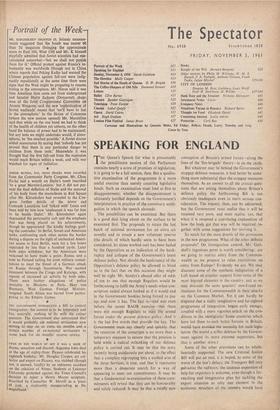—Portrait of the Week— MR. KHRUSHCHEV DROPPED IT. Seismic measure-
ments suggested that the bomb was nearer 60 than 50 megatons (bringing the approximate score to East 160, West 130) and Mr. K himself playfully admitted that Soviet scientists had mis- calculated somewhat—'but we .shall not punish them for it.' Official protest against Russia's in- humanity was worldwide (though not in China where reports that Peking Radio had warned the Chinese population against fall-out were indig- nantly repudiated); at the same time there were signs that the West might be preparing to resume testing in the atmosphere. Mr. Nixon said it was time American tests came out from underground and Senator Harry Jackson (Democrat), chair- man of the Joint Congressional Committee on Atomic Weapons, said the new 'sophistication of Soviet warheads' meant that 'we'll have to test in the atmosphere.' In the House of Commons (where the new session opened) Mr. Macmillan said that while on the one hand we had to think of the health of children yet unborn, on the other hand the balance of power had to be maintained; but any tests we might undertake would, if atmo- spheric, be 'the smallest possible.' A Soviet doctor added reassurance by saying that 'nobody has yet proved that there is any particular danger to children from these tests.' Meanwhile it was thought that the first fall-out from the explosion would reach Britain within a week, and milk was watched for signs of radiation.
INSIDE RUSSIA, too, more shocks were recorded from the Communist Party Congress.. Mr. Chou En-lai laid a wreath on Stalin's tomb inscribed `to, a great Marxist-Leninist,' but it did not pre- vent the final deflation of Stalin and the removal of his body from the mausoleum in Red Square after Mr. Khrushchev had revealed to the Con- gress further details of the terror and Comrade Lazurkina had 'talked with' Lenin and been told by him how 'unpleasant it was for him to lie beside Stalin.' Mr. Khrushchev again deprecated the personality cult and the emphasis that was being placed on his achievements, though he appreciated 'the kindly feelings guid- ing the comrades.' In Berlin, Soviet and American tanks, confronting each other across the border during a dispute on the right of unchecked Ameri- can access to East Berlin, were for a few hours separated by less than a hundred yards. Later both sides withdrew; but the Americans were reckoned to have made a point. Russia sent a note to Finland calling for joint military consul- tations to meet the threat of a German attack on Russia through Scandinavia. War seemed imminent between the Congo and Katanga, with reports of increased air activity by both sides. There were further allegations of police brutality to Moslems in Paris. Herr von Brentano, West German Foreign Minister, resigned. South Africa was barred from partici- pating in the Empire Games.
* THE GOVERNMENT INTRODUCED a bill to control immigration; the control is to be temporary and has, naturally, nothing to do with the colour question. The Government also announced that it would probably ask national servicemen now serving to stay on an extra six months and a certain number of ex-national servicemen to come back for six months' reserve service.
* .
EVEN IN THE WORLD OF ART it was a week of drama, sensation and discord. Augustus John died at the age of eighty-three. Picasso celebrated his eightieth birthday. Mr. Douglas Cooper, art col- lector and expert on Picasso, was stabbed (though not, it seemed, fatally) by an unknown assailant on the outskirts of Nimes. Students at Leicester University protested against the Town Council's decision to reject a Henry Moore sculpture, described by Councillor W. Merrill as a 'piece of junk, a mediocrity masquerading as the magnificent.'














































 Previous page
Previous page